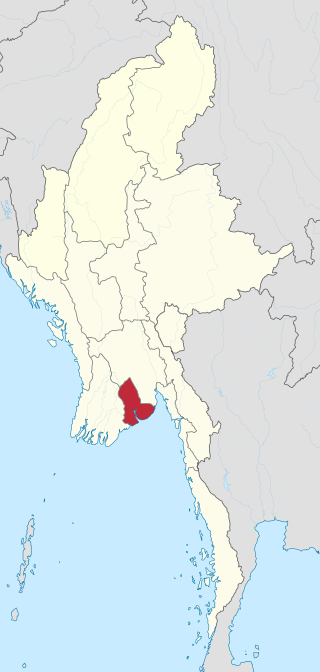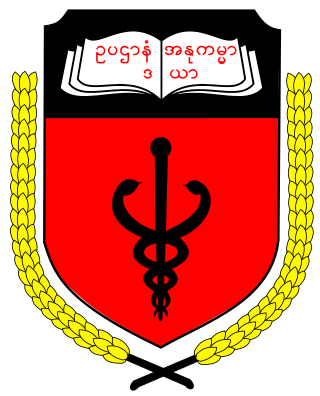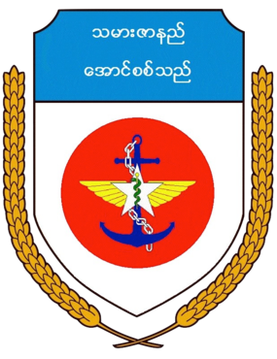
Yangon, formerly romanized as Rangoon, is the capital of the Yangon Region and the largest city of Myanmar. Yangon served as the capital of Myanmar until 2006, when the military government relocated the administrative functions to the purpose-built capital city of Naypyidaw in north central Myanmar. With over five million people, Yangon is Myanmar's most populous city and its most important commercial centre.

Yangon Region is an administrative region of Myanmar. Located in central Myanmar, the region is bordered by Bago Region to the north and east, the Gulf of Martaban to the south, and Ayeyarwady Region to the west. Yangon Region is dominated by its capital city of Yangon, the former national capital and the largest city in the country. Other important cities are Thanlyin and Twante. The division is the most developed region of the country and the main international gateway. The division measures 10,170 km2 (3,930 sq mi).

The University of Yangon, located in Kamayut, Yangon, is the oldest university in Myanmar's modern education system and the best known university in Myanmar. The university offers mainly undergraduate and postgraduate degrees programs in liberal arts, sciences and law. Full-time bachelor's degrees were not offered at the university's main campus after the student protests of 1996. The bachelor's degree was re-offered from 2014 on. Today degrees in Political Science are offered to undergraduate students, as well as postgraduate diplomas in areas such as social work and geology.

Mandalay Region is an administrative division of Myanmar. It is located in the center of the country, bordering Sagaing Region and Magway Region to the west, Shan State to the east, and Bago Region and Kayin State to the south. The regional capital is Mandalay. To the south of the region lies the national capital of Naypyidaw. The division consists of eleven districts, which are subdivided into 28 townships and 2,320 wards and village-tracts.

The University of Medicine, Mandalay, located in Mandalay is one of five medical universities in Myanmar. The university offers Bachelor of Medicine, Bachelor of Surgery (M.B.,B.S.) degree and postgraduate degrees in medical science.

The University of Medicine 1, Yangon, located in Yangon, it is the oldest medical school in Myanmar. The university offers M.B.B.S. degrees and graduate degrees in medical science. The university is perhaps the most selective university in the country, and admits approximately 400 students annually based on their University Entrance Examination scores.
There are five civil medical universities and one military medical academy in Myanmar (Burma). All medical schools are recognised by Myanmar Medical Council and State Government. They are:

The National University of Arts and Culture, Yangon is a public university, located in Yangon, Myanmar, that offers bachelor's and post-graduate degree programs in traditional Burmese performing and visual arts. The university's primary language of instruction is in English, and it accepts interested foreign students.

The University of Medicine 2, Yangon is a university of medicine, located in North Okkalapa, Yangon, Myanmar. The university offers M.B., B.S. degrees and graduate degrees in medical science. The university is one of the most selective in the country, and accepts approximately 300 students annually based solely on their University Entrance Examination scores.
The University of Dental Medicine, Yangon, is the leading university of dental medicine, located in Yangon, Myanmar. The university, along with the University of Dental Medicine, Mandalay, is one of only two universities of dental medicine in the country. The annual intake into both dental universities used to be 300 but from 2017 the annual intake for each university has been decreased to only 100. The country with a population of over 50 million had only about 1,500 dentists in 2005.
Myanmar Aerospace Engineering University is a specialized public university of aerospace engineering, located in Meiktila, Myanmar. The university offers undergraduate diploma, bachelor's degree and post-graduate diploma programs in several aerospace engineering specializations and technologies.

The Defense Services Medical Academy (DSMA), located in Mingaladon, Yangon, is the University of Medicine of the Myanmar Armed Forces. One of the most selective universities in the country, the academy offers M.B., B.S. degree programs. Upon graduation, most DSMA cadets are commissioned with the rank of Lieutenant in the Myanmar Army Medical Corps. The military physicians are to serve the healthcare needs of rural people when they are assigned in the country's remote regions where access to healthcare is poor.
The University of Medical Technology, Yangon is one of two universities of medical technology in Myanmar. The university offers four-year Bachelor of Medical Technology (B.Med.Tech) and two-year Master of Medical Technology (M.Med.Tech) degree programs in physiotherapy, medical laboratory technology and medical imaging technology. The university accepts approximately undergraduate 150 students annually. It is situated at Lower Mingaladon Road in Insein Township.

The University of Community Health, Magway (UCH) is a Community Health University under the Ministry of Health (Myanmar), and located in Magway city, Myanmar. The university offers a four-year Bachelor of Community Health (B.Comm.H) degree program. Students have to study how to perform community health. Also, they must take clinical subjects as integration for rural population whom can't get primary health care. Formally, the graduates are allowed to practice as Health Assistants (HA) in Department of Public Health and FDA of Myanmar, many of whom are the main providers of primary health care in rural Myanmar where access to regular physicians is difficult.

The Ministry of Health is a national government-run ministry administering health affairs and health care in Myanmar, including all of the medical schools. In 2016, President Htin Kyaw dissolved the Ministry of Sports (Myanmar) and organized it under the Ministry of Health.

Higher education in Myanmar has experienced a large expansion since 1988, although ranks as one of the lowest globally for universities. Due to the student protests in the 8888 uprising, the Myanmar government closed down all universities for two years. Additional student protests in 1996 and 1998 caused all universities to be closed for another three years.

Aung Tun Thet is a Burmese economist, author, educator, and public speaker. He had worked in academia, government service, private sector and in the civil society. He has published over 30 books and writes regularly in the local press.

Myint Htwe is a Burmese politician, public health physician, and former Minister for Health and Sports of Myanmar.
Nay Soe Maung is a Burmese physician and professor who served as Rector of the University of Public Health, Yangon from 2013 to 2017, and as President of the People's Health Foundation. He is also known as the anti-tobacco control activist in Myanmar.














